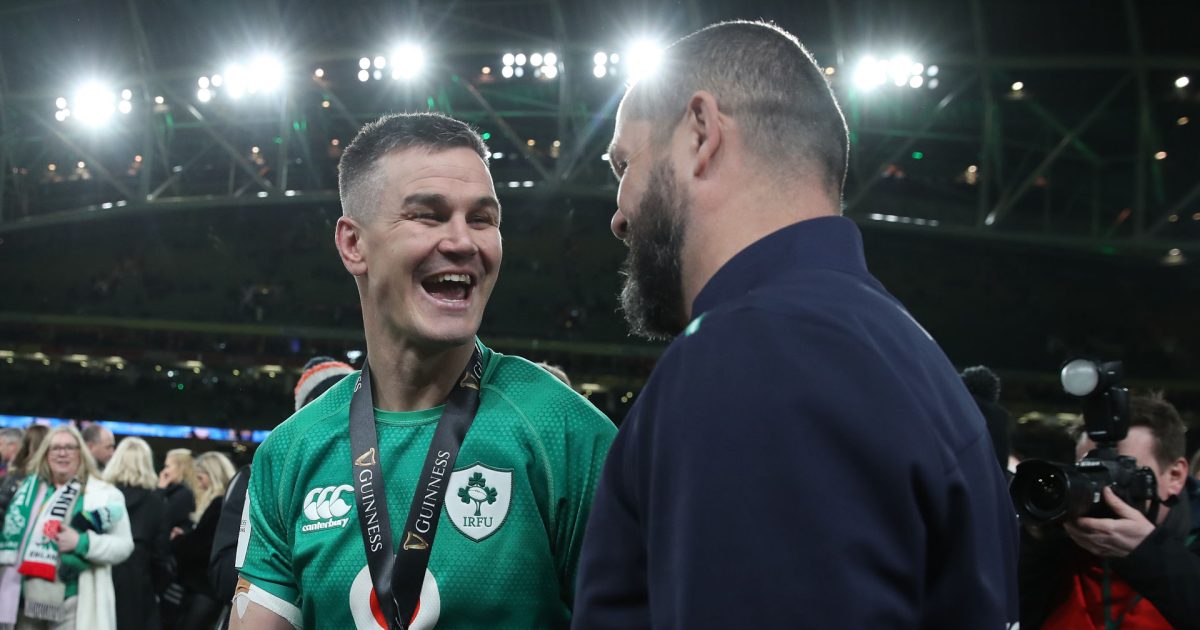Andy Farrell: The Englishman who led Ireland to the Grand Slam

Andy Farrell has guided Ireland to a Guinness Six Nations Grand Slam to cement his side’s position at the top of the world rankings following last year’s historic series success in New Zealand.
The 47-year-old stepped into the head coach role following the 2019 World Cup, having previously served as defence coach under predecessor Joe Schmidt.
Here, the PA news agency takes a closer look at the Englishman and highlights some of his greatest strengths.
Man management
Farrell, who has been part of the Irish setup since 2016, is still called ‘Faz’ by most of his squad and operates an open door policy with players. He has been praised for his emotional intelligence, while striking the right balance between humour and hard work without comprising his authority. On the subject of being approachable, the former dual-code international said: “What’s the point in players not being able to speak their mind to you? You end up just going backwards and going nowhere. I’d be gutted if they couldn’t.” He repeatedly urges individuals to ‘be themselves’ and cares just as much about players’ personal happiness as he does about professional development.
Unflappable mentality
Farrell openly embraces adversity. When a star player suffers injury, he prefers to talk of the opportunity for an understudy. He wanted the Principality Stadium roof closed so his players felt the full force of a raucous Cardiff crowd. He has welcomed the challenge of the team bus arriving late to a game – as happened to the annoyance of Schmidt in Scotland in 2017 – to see how his team respond. He laughed during half-time of last weekend’s chaotic win at Murrayfield when his injury-hit side were staring down the barrel of uncontested scrums and dropping to 14 men. The no-excuses mindset is a key attribute and has undoubtedly rubbed off on players.
Selection
Farrell has not been afraid to experiment during his tenure. He has handed out 30 international debuts but constantly championed a ‘no cheap caps’ mantra and selection has become more consistent as time has gone on. His search for fresh talent has unearthed a host of star names. Leinster trio Dan Sheehan, Caelan Doris and Hugo Keenan have become genuine world-class players, while Jamison Gibson-Park and Mack Hansen have progressed from relative unknowns to first-choice regulars. Farrell will leave the door ajar for potential World Cup bolters. Yet competition for places is already fierce and, with a fully-fit squad, his preferred starting XV will be difficult to dislodge.
Changing the culture
Players have repeatedly spoken of ‘bouncing into camp’ in recent years. While wins always boost morale, there is no doubt individuals feel liberated following the more regimented reign of Schmidt, a man who revolutionised Irish rugby. Farrell has changed the culture, encouraging players to ask questions and contribute to team meetings in a more relaxed and expressive environment. His fine tuning has included the appointment of performance guru Gary Keegan in a bid to remedy previous mental frailties. That move has been pinpointed as a major boost by many and Ireland look better equipped to deal with the pressure of being world number one than they did ahead of the last World Cup.
Tactics
In the early days of Farrell’s tenure, a definitive style of play was more difficult to distinguish. But, under his guidance, a slick system of short, swift interplay between the forwards and backs, with multiple dummy runners, has evolved. His surprise elevation of Gibson-Park to first-choice scrum-half has epitomised the desire for quick ball. Bringing ex-Ireland captain Paul O’Connell on board as forwards coach was a pivotal moment, marrying the strengths of Farrell and Schmidt. Farrell would regularly speak of “heads-up rugby” when he first took over. His team are now delivering on that. They regularly win and they usually entertain.
What next?
Ireland clinched a Grand Slam in Dublin for the first time with victory over England. But there is no chance Farrell will allow his team to rest on their laurels. Ireland have beaten each of rugby’s leading nations during the past 18 months and attention will swiftly turn to building towards the autumn World Cup in France. On a personal level, Farrell is heavy favourite to be the next British and Irish Lions boss. Understandably so following 22 wins from Ireland’s last 24 matches. He served as Lions defence coach under Warren Gatland for tours in 2013 and 2017, with the multi-nation team set to visit Australia in 2025.

































Impressed by the way Ireland turn adversity to their advantage, their physical fitness and their team spirit .
Reminded that behind their success is a good teacher.